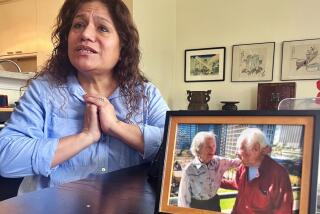Keeping memories from the clutches of Alzheimer’s
- Share via
“God gave us memory so that we might have roses in December.”
-- James Barrie
The Walt Travis I knew at San Francisco State was an amazing guy: scholar, debater, hobbyist magician, fraternity brother and one hell of a lot of fun.
He could stand before a hostile audience, face a debating opponent with the cool logic of a forensic scientist and turn him into gelatin. When the crowd booed the conquest of their hero, Walt would smile. He’d made his point.
He could also sit at a downtown bar and make coins and cigarettes vanish into thin air with the skill of a master prestidigitator, gathering a different kind of audience around him and winning free drinks for both of us.
But all of that is gone now, the tricks and the fun. The man I knew a long time ago is disappearing into himself, erased by a disease called Alzheimer’s.
I was thinking about him as I watched my family decorate our Christmas tree: my son Marty and his wife, Lisa, and three of our grandchildren, Nicole, Jeffrey and Joshua. Each ornament was hung with care. Small blinking lights framed their faces.
It was important to me to lock this moment into a memory component beyond erasures; I strained to fix it in my head the way a camera lens isolates a scene. I didn’t want what was happening to Walt to happen to me. There are some things that must never be forgotten.
I had heard from his wife the day before that Walt had been placed in a full-care facility, suffering from “dementia,” another way of describing the malady that is sucking the humanity from more than 5 million Americans.
“Walt’s short-term memory has been diminishing,” she wrote, “and he reached the point where his whole personality had changed. He became easily agitated, demanding and aggressive. I could no longer care for him.”
It’s a sad and terrible disorder, an erosion of the core mentality that contains the history of who we are, the memory of ourselves that makes us unique. I couldn’t believe it was happening to him.
I’ve known Walt since he was a returning World War II veteran in college on the GI Bill and I was a kid out of high school.
He was a scholarly patrician who would go on to earn a PhD at Columbia University, and I was a dour and scruffy beatnik wannabe who worked on the college newspaper and wrote unintelligible poetry; I never did finish up with a degree.
He followed his dream into teaching, and I followed mine into writing.
We kept in touch by letter, but I hadn’t seen him face to face until about three years ago.
When Cinelli and I learned that he and his wife had a place in Palm Springs, we made it a point to meet them for dinner on a weekend trip. It was a strange encounter.
There was a peculiarity about Walt. He had always been a soft-spoken man, intellectual in conversation, but possessed of a nimble sense of humor. Now he was loud and repetitive, greeting with raucous bursts of laughter moments from our past that weren’t especially funny or that had never actually occurred, and repeating them many times over, as though each telling was new.
When he fell silent, he seemed abruptly detached, as though he were viewing from afar, directing his focus on someone beyond the room.
I had seen that look before in another man I knew, a much younger person than the 79-year-old Walt. His name was Buddy Epstein. He was in the early stages of Alzheimer’s and coldly aware of the fate that would lead him into darkness. He described it as a slow disappearance. “One day you’re here,” he said, “and one day you’re not.”
Cinelli and I wondered if Walt was on the edge of that same darkness when we last saw him in Palm Springs. And now our fears had been confirmed. The Walt we had both known simply no longer existed.
That was reason enough for me to view with intensity the evening my family was decorating our tree. There are moments we must not abandon, beyond major achievements and professional triumphs. Careers end and plaques tarnish, but the eyes of Christmas, for instance, remain forever bright.
One must remember with equal clarity the nuances of a lover’s voice and the cry of a baby’s frustration; the aroma of pine trees and the cool, clean perfumes of a rainy day. I am determined never to give up a vision of Cinelli’s smile or the warm embracement of a summer’s eve.
They are blips in time to be absorbed. They pass too quickly and are gone so completely.
--
almtz13@aol


